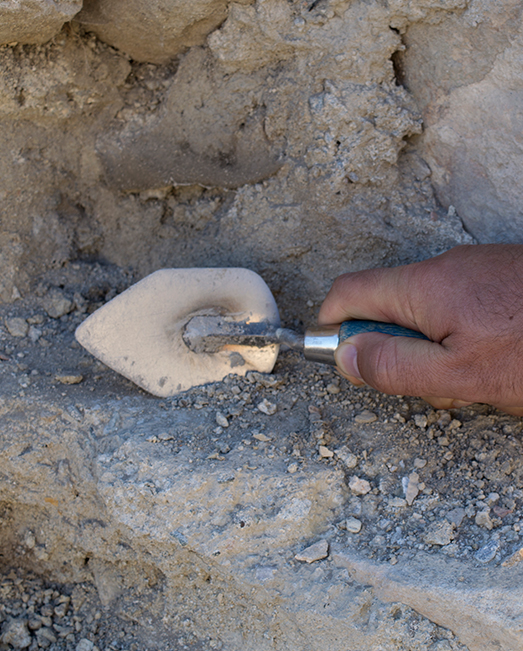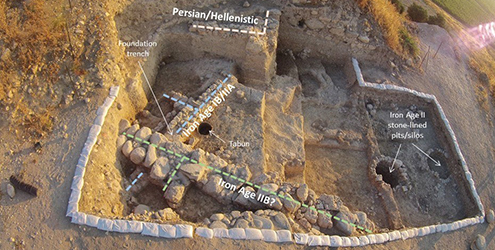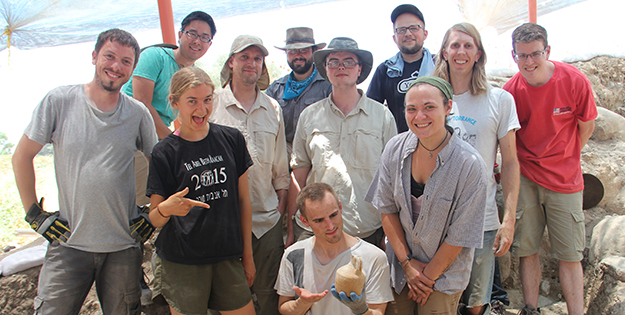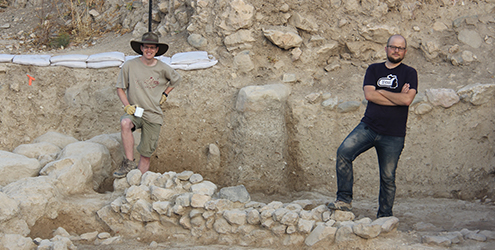Career
Copyright@ Australian Catholic University 1998-2024 | ABN 15 050 192 660 CRICOS Reg: 00004G
Copyright@ Australian Catholic University 1998-2024 | ABN 15 050 192 660 CRICOS Reg: 00004G

Is it all golden icons, booby traps and faraway places? We talk to an archaeologist to find out.
Archaeology is often romanticised, traveling the world and stumbling across long-lost artifacts etc… is it really like that?
“It would be a bit cynical of me not to admit that there are elements of that, yes. But it’s important to note that even Indiana Jones (whom I’m professionally obligated to mention at some point) would have looked a bit outdated even in the 1930’s when most of his movies are set. Archaeology in the years leading up to World War II was starting to take shape as the profession it is today. It’s a combination of hard physical work, careful recording, data processing, scientific analysis, theory and intensive library research. We’re obligated to excavate and record the results with care and precision, which is interesting but obviously very different from nabbing an idol from a Mayan temple. Archaeology can seem a long way from that romantic ideal, but that’s ultimately a good thing, and it’s still a lot of fun and very satisfying.”
“Archaeology is important because understanding humanity is important, and the state of the world now is the sum of all that history of humanity that has come before. At the moment the Middle East is facing a real crisis in terms of the preservation of its incredible but very vulnerable heritage, especially in places like Syria and Iraq. The situation there has really thrown light on why archaeology and archaeologists are indispensable.”

The Tel Abel Beth Maccah site in the Huleh Valley, Israel.
“I started thinking about going into archaeology when I was studying theology. I was focusing on biblical studies and the most interesting thing about the Bible is without a doubt the cultural and historical context it comes from. That was my first exposure to the archaeology of ancient Israel, and I discovered it was both complex and fascinating.”
“This year will be my second summer at Tel Abel Beth Maccah, in the Huleh Valley in the far north of Israel. The word ‘tel’ means ‘mound’ in Hebrew, so it’s basically a large artificial hill made out of human occupation. The site has a long history of occupation, perhaps as far back as the third millennium BC, but its main period as a city as far as we can tell was in the Middle Bronze Age and the earlier part of the Iron Age.
The site is one of the largest in the far north of Israel and sits in an area that in the Iron Age (about 1200-550 BC) would have been a cross-road of sorts between Israel to the south, the Phoenicians in what is now Lebanon, and the Arameans to the north-east in what is now Syria.”
“Effectively, yes, but there are always complications that emerge in archaeology that can affect what a site will reveal about itself. At Tel Abel Beth Maacah for example, the highest part of the mound, which would usually be a prime target for excavation, is partly covered by a couple of old Israeli army bunkers, so that’s a bit frustrating.”
“Last year I supervised a section of my area right near those old army bunkers, and we found part of a large wall from the Iron Age. It could be a defensive wall, which means there was likely something serious going on around this part of the tel. This happened over the course of a week, mind you.”

“We live on a kibbutz (originally communal farming villages) during the season. Obviously it doesn’t have all the comforts of home but I do get to dig with a very enjoyable group of people who I like working with very much. The kibbutz is very pleasant and we have some fun in our downtime.”
“It’s a relatively small group compared to other excavations in Israel and has many graduate students like myself, mostly from Israel and the US. You also get volunteers who come just for the love of digging or the experience. Our fearless leaders who direct the dig are Professor Bob Mullins of Azusa Pacific University in Los Angeles and Drs Nava Panitz-Cohen and Naama Yahalom-Mack of the Hebrew University of Jerusalem.”
“Our excavation takes place in the Israeli summer, so to avoid the heat we have to wake up very early, around 4.30am, dig until breakfast, and then dig again until lunchtime. We then return to the kibbutz and after lunch do office work and wash all the pottery we collected the previous day (you find a lot a pottery). We also sort the pottery according the period it’s from. After dinner we sometimes have a lecture, or just chill out.”

“Finding something that contributes to the understanding of the site, and being able to discuss it with my learned colleagues right then and there. I also like that even as you’re just moving dirt, you’re always learning.”
“Getting up so early. Even if you’re a morning person it can be tough, and I’m not, but you get used to it (more or less) after the first week or so.”
Zachary Thomas completed a Bachelor of Theology at ACU. Find out where theology at ACU can take you.
Copyright@ Australian Catholic University 1998-2024 | ABN 15 050 192 660 CRICOS Reg: 00004G